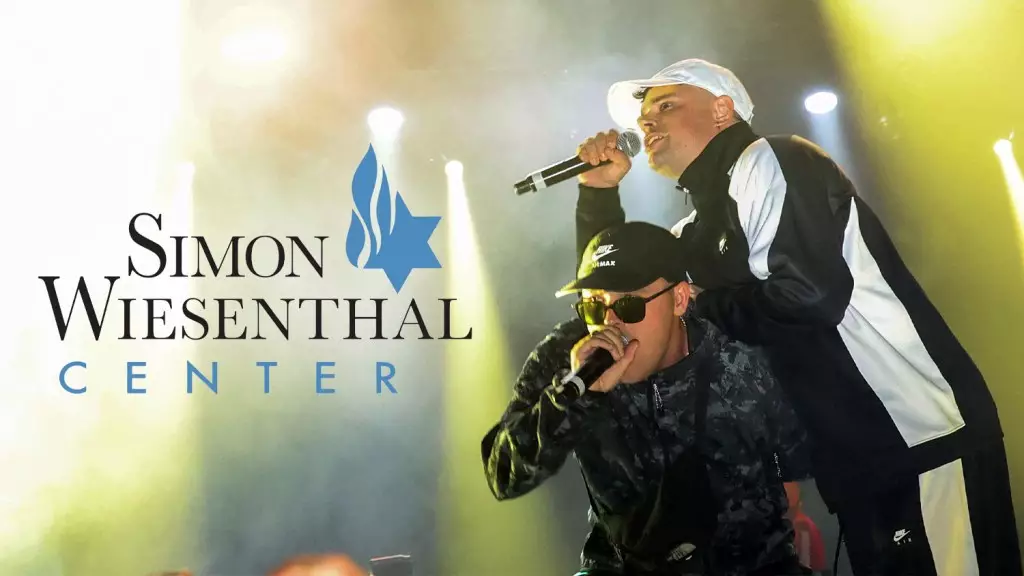The world of music festivals often stands as a microcosm of broader societal issues, and few recent events have highlighted this as vividly as the Irish hip-hop trio Kneecap’s performance at Coachella. Their bold statement, “F*ck Israel, Free Palestine,” reverberated beyond the festival grounds, igniting a firestorm of reactions. While they aimed to make a political stand, their approach raised critical questions about the responsibilities of artists, particularly in the context of sensitive geopolitical conflicts. The ensuing backlash from the Simon Wiesenthal Center underscores not only the challenges of using art for activism but also the potential ramifications of such incendiary rhetoric in a divided world.
Kneecap, known for their provocative style, appeared to embrace controversy as part of their identity. However, the context of their performance complicates this narrative. The songs and statements made at Coachella were not created in a vacuum; they were responses to the ongoing Israeli-Palestinian conflict, which has claimed numerous lives and uplifted strong emotions on all sides. Yet, by framing their performance in such a confrontational manner, the trio risks alienating audiences who might otherwise support their message.
Music as a Platform for Protest
Activism through music is as old as the genre itself, with artists historically using their platforms to address social injustices. From Bob Dylan’s protest songs of the 1960s to the powerful anthems of today, music has the power to unite, inform, and challenge dominant narratives. However, Kneecap’s approach seems to flirt dangerously with demagoguery. Their explicit condemnation of Israel during a festival that also saw significant violence directed against Israelis raises the specter of hatred rather than empathy. Jim Berk, CEO of the Wiesenthal Center, pointedly remarked that music should foster understanding, not division.
This incident serves as a compelling case study regarding the efficacy of protest within music. At what point does the desire for political expression cross the line into fostering hatred? The fine line here is essential, as it suggests that artists must navigate not only the depths of their convictions but also the potential fallout from their declarations. By choosing to target a complex political situation with incendiary slogans, Kneecap ultimately risks undermining their audience’s critical thinking and empathy.
The Role of the Music Festival
Coachella functions as more than just a gathering of musical talent; it serves as a cultural touchstone, a place where societal dialogues unfold, albeit under the guise of entertainment. For many attendees, festivals are opportunities to engage with broad, sometimes contentious topics. Yet, when artists leverage these events purely for shock value, the potential for genuine conversation diminishes.
Moreover, the possible encroachment of censorship—illustrated by the festival’s decision to cut parts of Kneecap’s performance from their livestream—raises ethical questions. Should artists be allowed to express politically charged sentiments, regardless of their extremity, in a public space designed for enjoyment? The duality of artistic freedom versus audience expectation becomes strikingly relevant here. While Kneecap’s statements may resonate with some, they could easily detract from the festival experience for others, perpetuating a cycle of division among fans.
A Call for Thoughtfulness in Expression
In the aftermath of such headline-grabbing events, it’s essential to reflect on the role artists assume when they take on political causes. As Kneecap faces criticism, it may be a valuable moment for them to reassess their methods. Instead of a blanket denunciation of an entire nation, would it be more impactful to focus on individual experiences, narratives that cultivate empathy, or collective calls for peace?
As society continues to grapple with the complexities of the Israeli-Palestinian conflict, the responsibility of artists becomes even more significant. Rather than amplifying division, music should serve as a bridge for dialogues that heal wounds rather than deepening them. In a world rife with violence and polarization, it becomes increasingly crucial to consider how best to channel passion and political sentiment in ways that resonate ethically and positively.
Kneecap’s approach may be emblematic of a growing trend among entertainers, where sensationalism often overshadows substance. In doing so, they may inadvertently contribute to a cycle of animosity that stymies productive discourse. As artists navigate this multifaceted landscape, the hope is that they choose to uplift and educate rather than provoke and alienate.

